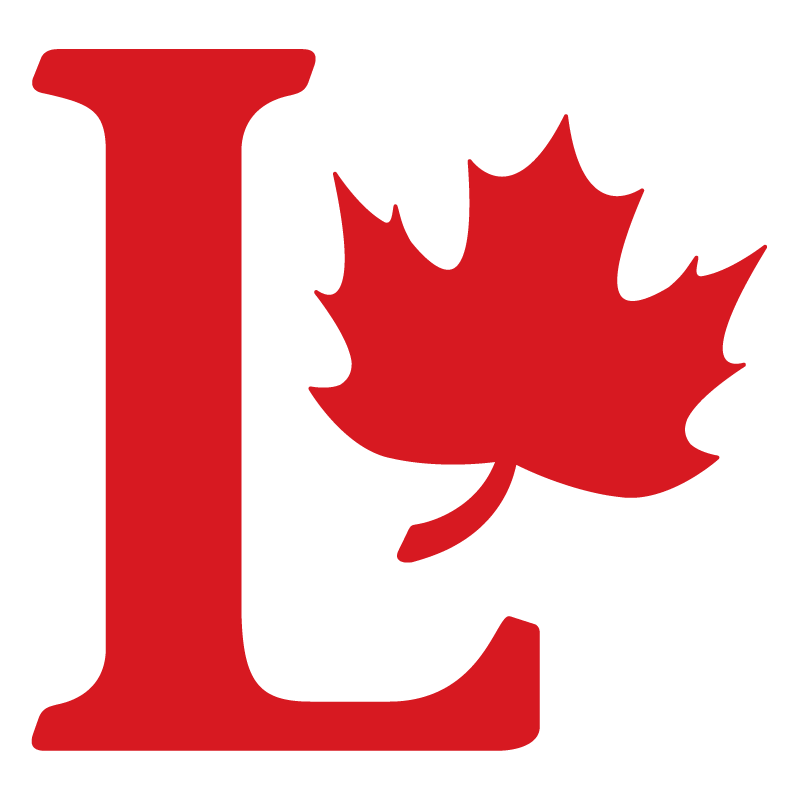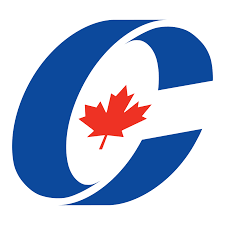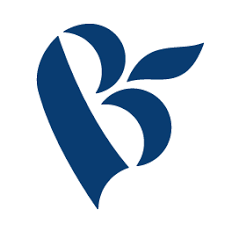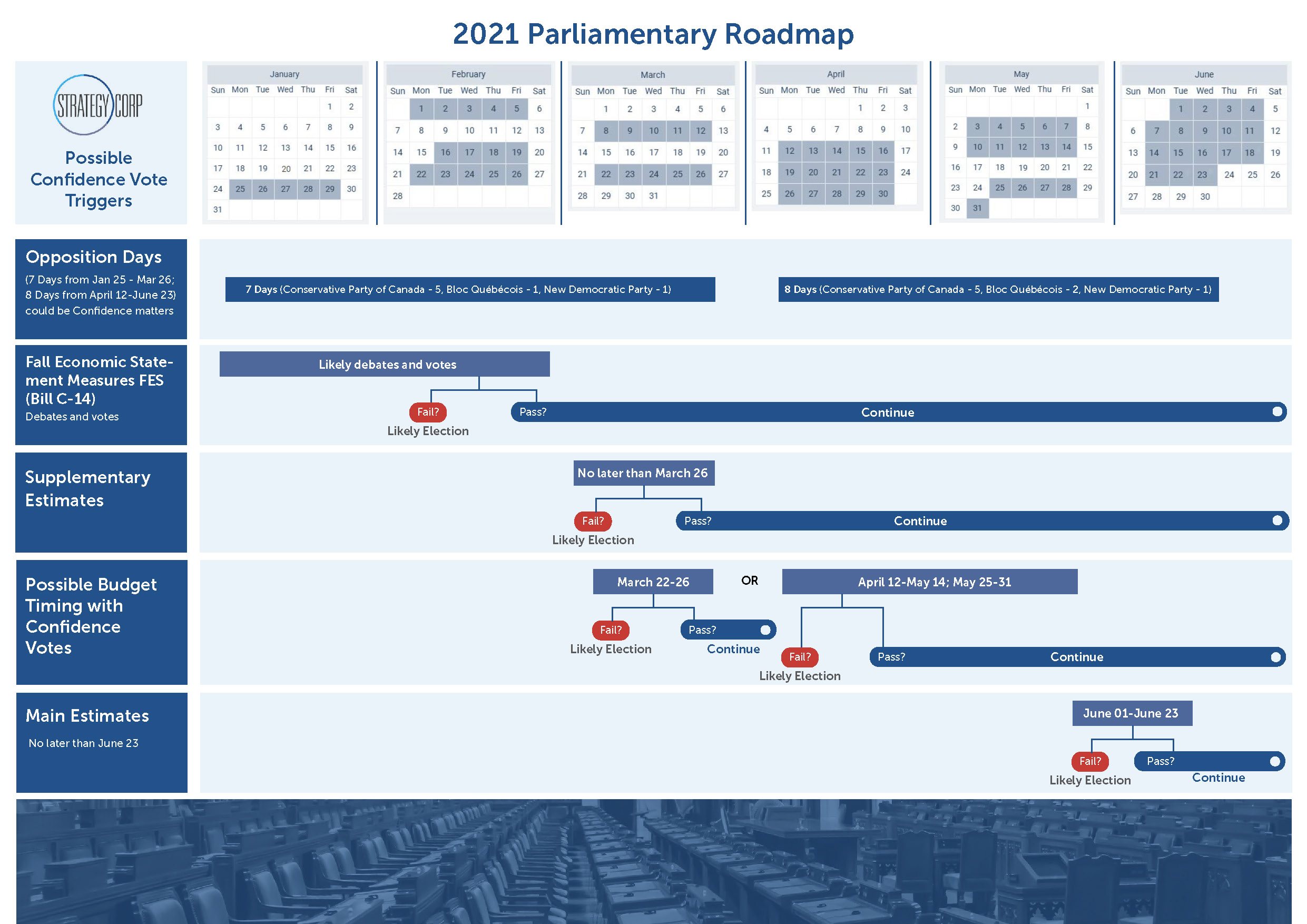Is a Spring 2021 Federal Election on the Horizon?
The House of Commons has returned from its holiday break for its January to June spring sitting. The political landscape increasingly suggests that a spring election may be in the offing as the governing Liberals will at some point have to try and find a way to move their minority position back to a majority government.
Key Factors
The Cabinet shuffle on January 12 was an early indication that Prime Minister Justin Trudeau may be “clearing the decks” for a spring election. As the holiday season is a good time for reflection on political futures, Prime Ministers or their senior advisors often seek an indication from Ministers whether they will run again in the next election. This has happened many times before in recent memory. For example, in January 2019, then-Liberal Minister Scott Brison announced his departure from public life, while in early 2015, former Conservative-era Minister John Baird also announced his resignation.
This time, it was Innovation, Science and Industry Minister, Navdeep Bains taking his leave from public life to spend more time with his family. This necessitated a medium-sized Cabinet shuffle. Bains, a stalwart of “Team Trudeau” that came into power in 2015, was one of the few Ministers to spend his entire mandate in one portfolio. He is also a trusted political lieutenant in the Greater Toronto Area (GTA) so the government had to fill this gap as well. In addition to his portfolio as Canada’s new Transport Minister, Omar Alghabra will also have this political role as well.
The other key electoral area for the Liberals is Montreal and the surrounding area. This is where the new Industry, Minister Francois-Phillippe Champagne, will certainly have an eye on the innovation and industrial agenda in Quebec, while continuing the work that Bains had started with Superclusters and the Strategic Innovation Fund, amongst other things. For the Liberals to win a majority government, they must win more seats in Quebec, and Champagne will be expected to use some of his power and influence to deliver more Quebec MPs. (Of note, the Liberals lost 5 seats in Quebec between 2015 and 2019.)
The decision to move Champagne to the Industry portfolio created a vacancy for the Minister of Foreign Affairs, and it was filled by Montreal-area MP, and former astronaut, Marc Garneau. Garneau made the move from the Transport portfolio to fill this spot. He was previously the foreign affairs critic for the Liberals in 2013-15. Garneau was also the Chair of the Cabinet Committee on Canada-US Relations from 2017-19, replacing Chrystia Freeland when she became Minister of Foreign Affairs.
Political Landscape
Any minority government is always thinking about the political calculus about when the best time may be to seek a majority mandate. This was especially true in the fall of 2020 as two minority governments in New Brunswick and British Columbia decided to test the electorate and were able to turn minorities into strong majority governments.
 As the Liberals think about the possibility of an election, the reality is that health and the economy are inextricably linked – getting the virus under control is necessary to seek a mandate to rebuild the economy. As such, vaccine supply is critical to beating the virus and enabling economic recovery – it is a necessary political condition that must first be met for the Liberals to call an election this year.
As the Liberals think about the possibility of an election, the reality is that health and the economy are inextricably linked – getting the virus under control is necessary to seek a mandate to rebuild the economy. As such, vaccine supply is critical to beating the virus and enabling economic recovery – it is a necessary political condition that must first be met for the Liberals to call an election this year.
On the vaccine, the Liberals will need to focus on efforts to secure contracts, rapidly deliver vaccines to provinces and territories, and enable the provinces and territories to get the vaccines into arms as quickly as possible. The Liberals know their future is tied to whether Canadians determine the government has done its job in delivering a steady supply of vaccines in a timely manner.
Once the vaccine roll-out is under control, the Liberals would like the electoral ballot question to be on the question of how to handle a post-pandemic economic recovery. The Liberals view stimulus spending as necessary in medium term and will define this vision in Budget 2021. Minister Freeland’s mandate letter notes that she is to “avoid creating new permanent spending.”
 For Conservatives, they will need to use the upcoming session of Parliament to focus on establishing a strong narrative on why they should be considered as a government-in-waiting. Daily Question Periods and other opportunities to earn national media attention will certainly be welcome, especially with relatively new leader Erin O’Toole trying to define himself in the eyes of voters before his opponents do.
For Conservatives, they will need to use the upcoming session of Parliament to focus on establishing a strong narrative on why they should be considered as a government-in-waiting. Daily Question Periods and other opportunities to earn national media attention will certainly be welcome, especially with relatively new leader Erin O’Toole trying to define himself in the eyes of voters before his opponents do.
However, the last few weeks have been challenging for the Conservatives as they seek to find their feet. This past week, the Caucus voted to remove Ontario MP and former Leadership Candidate Derek Sloan for a “pattern of destructive behaviour involving multiple incidents and disrespect towards the Conservative team for over a year.” The most recent incident involved a donation that Sloan received in his leadership bid from a known white supremacist, at a time when the events at the Capitol in Washington remain fresh in the minds of many. Many Conservative MPs will breathe a sigh of relief after Sloan’s removal, as they believe they can now focus on their main task of providing an alternative to the governing Liberals.
 For New Democrats, while they continue to try and portray themselves as the “social conscience” of the House of Commons, the challenge for them will continue to be that they have consistently provided the Liberals with enough votes to pass finance-related legislation and therefore kept the Liberal minority government in power. While they have portrayed this as being the act of a “responsible” Opposition, there will come a point when they will decide they can no longer support the Liberals. This decision may be easier for the NDP to make now that their 2019 campaign debt has been paid.
For New Democrats, while they continue to try and portray themselves as the “social conscience” of the House of Commons, the challenge for them will continue to be that they have consistently provided the Liberals with enough votes to pass finance-related legislation and therefore kept the Liberal minority government in power. While they have portrayed this as being the act of a “responsible” Opposition, there will come a point when they will decide they can no longer support the Liberals. This decision may be easier for the NDP to make now that their 2019 campaign debt has been paid.
 The Bloc Quebecois has increasingly voiced opposition on confidence matters over the course of 2020, after having originally supported the Liberal’s March 2020 financial response to COVID-19. They will be looking at the electoral math in the ridings they hold in Quebec, and their goal continues to be to demonstrate they are “standing up for Quebec” at every turn – while Liberals eye seats they previously held in Quebec as a possible road map to an electoral victory.
The Bloc Quebecois has increasingly voiced opposition on confidence matters over the course of 2020, after having originally supported the Liberal’s March 2020 financial response to COVID-19. They will be looking at the electoral math in the ridings they hold in Quebec, and their goal continues to be to demonstrate they are “standing up for Quebec” at every turn – while Liberals eye seats they previously held in Quebec as a possible road map to an electoral victory.
Parliamentary Electoral Triggers
In a normal year, the federal financial calendar has certain events at regular intervals that help to inform decision-making around budgetary decisions, some of which are confidence measures. If a government is defeated on a confidence measure, this usually leads directly to an election.1 In addition, “confidence” is a matter of convention, and not a rule – ultimately it is up to the government to determine what is or is not a confidence motion.2
However, over the course of 2020, the pandemic completely threw the regular financial playbook out the window. Canada has not had a federal budget since March of 2019. November’s Fall Economic Statement (FES) certainly provides a window into the government’s planning for a spring 2021 budget but is not a full budgetary document. (The bill to bring in financial measures contained in the FES has not yet been debated at Second Reading).

While a “six month” calendar may seem like plenty of time for a government to implement its agenda, the reality is that there are a maximum of 76 sitting days from January to June.
StrategyCorp has prepared a 2021 Parliamentary Roadmap for our clients which details several electoral triggers that the government faces over the coming weeks and is attached to this document. These triggers are as follows:
- Opposition Days – These debates are initiated by each of the Opposition parties that are votable and can be used explicitly by the Opposition as motions of non-confidence (or declared by the Government to be seen as a motion of non-confidence). They are allocated based on the number of seats an opposition party holds in the House of Commons:
- The Government determines which days will be Opposition Days
- There are 7 Opposition Days from January 25 to March 26, and 8 from April 12 to June 23
- In the first tranche, 5 are Conservative, 1 for the Bloc and 1 for the New Democrats
- In the second tranche, 5 are Conservative, 2 for the Bloc and 1 for the New Democrats
- That means that 20% of House-sitting time is controlled by the Opposition parties.
- Bill C-14 – This bill contains the legislative measures required to implement the items announced in November’s Fall Economic Statement. Debate and votes on C-14 are likely to take place in the first two weeks of the House sitting, and these votes would be matters of confidence.
- Supplementary Estimates – These are tabled in the House of Commons usually in February and referred to House Committees for study. Supplementary Estimates will be the government’s final request for Parliamentary approval on spending authority for fiscal year 2020-21 (which ends March 31).
Given the House of Commons calendar, they must be passed by March 26. As they relate to financial matters, Supplementary Estimates are matters of confidence.
- Budget 2021 – Trying to determine budget timing is one of political Ottawa’s favourite parlour games, no matter who is in power. Given that the Fall Economic Statement only came out at the end of November, and that supplemental mandate letters were only issued in early January alongside a Cabinet shuffle, most people are betting that Budget 2021 will be later rather than earlier.
- Given the House of Commons calendar, the House only sits for two weeks in March, and breaks between March 26 and April 12. The budget and its relevant votes could take place during the two sitting weeks in March. However, given the late timing of the FES, it is also possible for the budget to be later than March.
- Main Estimates – These are the government’s general spending plans for fiscal year 2021-22, which begins on April 1. These are usually tabled in March and referred to House committees for study until May 31. The House must then vote on them between June 1 and the last sitting day which can be no later than June 23 (although the House may rise before that).
Like Supplementary Estimates, Main Estimates are matters of confidence as they relate to financial matters.